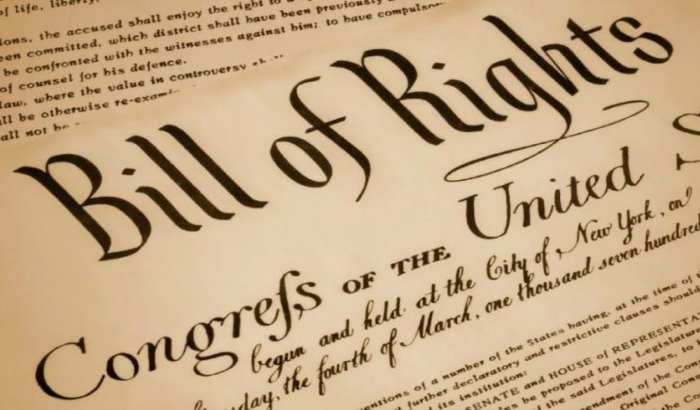Bill of rights apush significance – The Bill of Rights, the first ten amendments to the United States Constitution, holds immense significance in American history, shaping the nation’s legal system, protecting individual liberties, and serving as a beacon of democracy. Its creation was influenced by Enlightenment ideals and the American Revolution, and its enduring relevance continues to shape debates on individual rights and government authority in the 21st century.
Historical Context

The Bill of Rights emerged from the historical context of the American Revolution and the Enlightenment. The American colonists, influenced by Enlightenment ideas emphasizing individual liberty and limited government, sought to protect their rights from potential tyranny by the new federal government.
Enlightenment Ideas, Bill of rights apush significance
- Natural rights: Inherent and unalienable rights belonging to all individuals by virtue of their humanity.
- Limited government: Government’s power should be restricted to protect individual rights.
- Social contract: Individuals consent to be governed in exchange for protection of their rights.
American Revolution
- Declaration of Independence: Proclaimed the natural rights of life, liberty, and the pursuit of happiness.
- Articles of Confederation: Weak central government with limited powers, reflecting fear of tyranny.
Content and Structure

The Bill of Rights consists of ten amendments to the U.S. Constitution, adopted in 1791. They are organized into three groups:
First Amendment: Freedoms of Religion, Speech, Press, Assembly, and Petition
- Protects religious freedom, free speech, free press, and the right to assemble and petition the government.
Second through Tenth Amendments: Rights of Individuals and States
- Second Amendment: Right to bear arms.
- Third Amendment: Protection against quartering soldiers.
- Fourth Amendment: Protection against unreasonable searches and seizures.
- Fifth Amendment: Rights of the accused, including due process and protection against self-incrimination.
- Sixth Amendment: Right to a fair trial, including the right to counsel.
- Seventh Amendment: Right to a jury trial in civil cases.
- Eighth Amendment: Prohibition of excessive bail and cruel and unusual punishment.
- Ninth Amendment: Unenumerated rights retained by the people.
- Tenth Amendment: Powers not delegated to the federal government are reserved to the states or the people.
FAQ Corner: Bill Of Rights Apush Significance
What is the historical context of the Bill of Rights?
The Bill of Rights emerged from the historical events and circumstances surrounding the American Revolution, influenced by Enlightenment ideas and the desire to protect individual liberties from government encroachment.
How has the Bill of Rights impacted American society?
The Bill of Rights has profoundly shaped American society by safeguarding individual freedoms, such as freedom of speech, religion, and assembly, and by establishing a framework for a fair and impartial legal system.
What is the contemporary relevance of the Bill of Rights?
The Bill of Rights remains highly relevant in the 21st century, continuing to guide debates on individual rights, government authority, and the balance between liberty and security.
